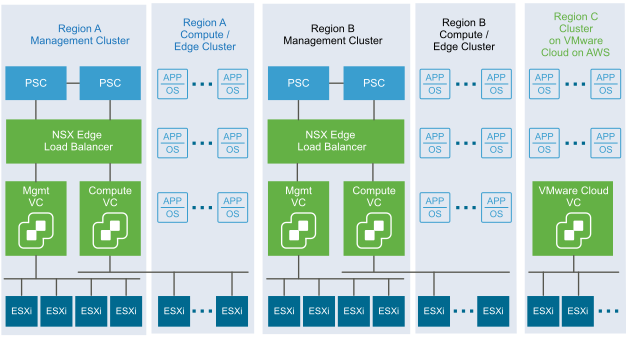When deploying an SDDC on VMware Cloud on AWS, you must select the deployment location and the number of hosts for the initial cluster for your use case.
Selecting an AWS Region and Sizing the Initial Host Configuration
When deploying the SDDC on VMware Cloud on AWS as Region C of your validated SDDC, select the AWS Region location according to these criteria:
-
Location latency
-
Data sovereignty
-
Co-location with existing services
-
Cost
You can use any VMware Cloud enabled AWS region. This design uses US West (Oregon) as an example.

| Resource |
Used |
Free |
|---|---|---|
| CPU |
9 GHz |
240 GHz |
| Memory |
212 GB |
1.3 TB |
| Storage |
5.5 TB |
12.5 TB |
The on-premises and cloud units of the hybrid SDDC support maintenance operations in different ways.
- VMware Validated Design for Software-Defined Data Center defines a minimum of four ESXi hosts in the on-premises management cluster. Allocating four ESXi hosts provides full redundancy in the cluster.
- During maintenance operations in VMware Cloud on AWS environments, to provide enough capacity and redundancy for the update, VMware Cloud on AWS adds temporarily another host to the SDDC. VMware vSphere® vMotion™ and DRS activities occur to facilitate the update. During this time, your workloads and other resources function as usual. Adding permanently hosts to the initial cluster is not required.
| Decision ID |
Design Decision |
Design Justification |
Design Implication |
|---|---|---|---|
| SDDC-VMC-PHY-001 |
Deploy the SDDC on VMware vCloud on AWS in an AWS Region that has the lowest latency to your on-premises infrastructure while meeting all other business requirements. |
Having all infrastructure closely or centrally located provides an optimal user experience. However, make sure that this setup is not at the expense of laws or infrastructure features. |
While most AWS locations have the same pricing model, slight variations exist. These variations might change the overall service cost if the closest AWS region does not meet the requirements of your organization. |
| SDDC-VMC-PHY-002 |
Deploy the SDDC on VMware Cloud on AWS with three hosts. |
Using the initial minimum cluster size still provides a significant amount of resources to tenant workloads. You can easily extend clusters on demand. You can use single-host clusters for evaluation purposes, but they are not suitable for use in production. |
The resources provided by three hosts might not be initially needed and therefore potentially wasted. Smaller clusters are not supported for production workloads. |
Scaling Out an SDDC on VMware Cloud on AWS
While you can scale out the initial cluster, you can also add clusters to the SDDC. According to the operational and business requirements of your organization, you can use these additional clusters for other categories of service or environments, such as development or staging environments.
Before adding hosts to the initial cluster, size correctly the cluster by considering the number, size, and use of the tenant workloads you plan to provision.